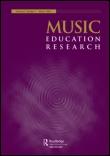
Music Education Research
Scope & Guideline
Fostering Excellence in Music Pedagogy
Introduction
Aims and Scopes
- Pedagogical Practices in Music Education:
The journal investigates various teaching methodologies and pedagogical approaches in music education, including informal, formal, and community-based practices, emphasizing their effectiveness and adaptability across different educational contexts. - Cultural and Social Contexts of Music Learning:
Research published in the journal often explores how cultural, social, and political factors influence music education, addressing themes of diversity, equity, and inclusion within music learning environments. - Development of Musical Identity and Engagement:
The journal examines how individuals develop their musical identities and engage with music across different life stages, including the impact of community, family, and educational settings on this process. - Innovative Research Methodologies:
Music Education Research encourages the use of innovative and interdisciplinary research methodologies, such as qualitative, quantitative, and mixed-methods approaches, to better understand complex phenomena in music education. - Music Education Policy and Advocacy:
The journal also focuses on the implications of educational policies on music education practices and advocates for the importance of music education in curricula at various educational levels.
Trending and Emerging
- Posthuman Perspectives in Music Education:
There is an increasing interest in posthuman and new materialist approaches within music education, exploring how these frameworks can reshape understandings of agency, identity, and the role of non-human elements in music learning. - Intercultural and Global Music Education:
Research on intercultural dialogue and global music education practices is gaining traction, reflecting a growing recognition of the importance of cross-cultural understanding and the integration of diverse musical traditions in educational settings. - Digital Learning and Technology Integration:
The integration of digital tools and online platforms for music teaching and learning has become a significant focus, especially in light of the recent global shift towards remote education, prompting research on effective practices in virtual environments. - Social Justice and Advocacy in Music Education:
A rising theme is the exploration of social justice issues within music education, addressing topics such as equity, access, and the role of music in fostering social change and community engagement. - Emphasis on Mental Health and Well-being:
Research focused on the mental health and well-being of music students and educators is emerging, highlighting the importance of supportive learning environments and the potential of music to enhance emotional and psychological resilience.
Declining or Waning
- Traditional Classical Music Pedagogy:
There has been a noticeable decrease in research centered around traditional classical music pedagogy, as the field increasingly embraces diverse musical genres and contemporary practices that resonate more with current educational contexts. - Standardized Assessment in Music Education:
Research focused on standardized assessment methods in music education appears to be declining, as educators and researchers shift towards more holistic and formative assessment strategies that better capture student growth and creativity. - Focus on Individual Performance:
There is a waning interest in research that solely emphasizes individual performance skills in music education, with a growing recognition of the importance of collaborative and community-based music-making experiences. - Conventional Teacher-Centered Approaches:
The journal has seen less emphasis on traditional teacher-centered approaches to music education, as there is a clear trend towards student-centered, participatory, and inquiry-based learning models.
Similar Journals
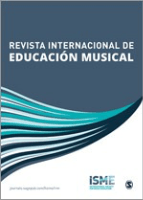
Revista Internacional de Educacion Musical
Connecting researchers and practitioners for a harmonious educational landscape.Revista Internacional de Educacion Musical, published by SAGE PUBLICATIONS LTD, is a prestigious journal dedicated to advancing the field of music education on a global scale. With an ISSN of 2307-4841, this journal serves as a vital platform for researchers, educators, and practitioners in music pedagogy, offering a wide array of peer-reviewed articles, theoretical discussions, and empirical studies. The journal aims to promote interdisciplinary dialogue and innovative practices within music education, emphasizing the importance of cultural diversity and contemporary educational methodologies. As part of SAGE Publications, known for its commitment to excellence in scholarly dissemination, the Revista Internacional de Educacion Musical plays a crucial role in shaping future trends and policies in music education. By fostering access to high-quality research, this journal is invaluable for those dedicated to enhancing the teaching and learning of music in educational contexts.

FONTES ARTIS MUSICAE
Exploring the intersections of music, scholarship, and creativity.FONTES ARTIS MUSICAE, with ISSN 0015-6191 and E-ISSN 2471-156X, is a distinguished journal published by A-R EDITIONS, specializing in the fields of Music and Library and Information Sciences. Established in the United States, this journal serves as a vital resource for scholars, practitioners, and students engaged in the exploration and analysis of music and its associated disciplines. With an established converged publication history from 2002 to 2024, FONTES ARTIS MUSICAE has consistently contributed to the discourse within its scope, reflected in its current quartile rankings of Q4 in Library and Information Sciences and Q3 in Music for 2023. Although not an open-access journal, it offers essential insights and research findings, appealing to a diverse academic audience. Its position within the 18th percentile of the Arts and Humanities (Music) category and 11th percentile in Library and Information Sciences underscores its growing significance in these fields, making it a critical platform for advancing knowledge and fostering collaboration.

Resonancias
Cultivating a Global Dialogue in Musicology.Resonancias is a distinguished open-access journal published by the Pontificia Universidad Católica de Chile, dedicated to advancing the field of music studies. With an ISSN of 0717-3474 and an E-ISSN of 0719-5702, this journal has been promoting scholarly discourse in music since its transition to open access in 2014. Resonancias serves as a critical platform for researchers, professionals, and students alike, enabling them to disseminate knowledge and explore innovative perspectives in musicology. With its current Q2 ranking in the field of music as of 2023, and a Scopus ranking of #108 out of 180, this journal exemplifies its commitment to quality and impact within the academic community, fostering an accessible database of music research from Chile and beyond. Situated at AVENIDA VICUNA MACKENNA 4860, MACUL, SANTIAGO, CHILE, Resonancias not only promotes original research but also includes critical reviews, interviews, and essays that contribute to the rich tapestry of musical knowledge.

Problemy Muzykalnoi Nauki-Music Scholarship
Pioneering Research in the Realm of Music ScholarshipWelcome to Problemy Muzykalnoi Nauki-Music Scholarship, a leading journal in the field of music scholarship published by the esteemed Gnesin Russian Academy of Music. With an ISSN of 2782-358X and an E-ISSN of 2782-3598, this Open Access journal has been committed to the dissemination of high-quality research since 2009, making scholarly work accessible to a global audience. Covering diverse aspects of music theory, history, and its socio-cultural impacts, Problemy Muzykalnoi Nauki serves as an essential platform for scholars, educators, and practitioners in the arts and humanities, as well as in social sciences related to music education. While its Scopus coverage was discontinued in 2021, the journal remains influential, holding a rank of #48 in the Arts and Humanities category and a percentile of 67th, showcasing its relevance and rigor in the discipline. We invite researchers and students alike to explore the rich contributions made within these pages, fostering a deeper understanding and appreciation of music in contemporary society.
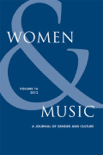
Women and Music-A Journal of Gender and Culture
Bridging Gender Studies and Musicology for a New EraWomen and Music: A Journal of Gender and Culture is a pioneering academic journal published by University of Nebraska Press, focusing on the intersection of gender and music. With a commitment to exploring issues pertinent to women and music in a range of cultural contexts, this journal provides a critical platform for scholars, musicians, and educators to share research that enriches our understanding of gender dynamics within the music industry and music's role in society. While currently not an open-access journal, it aims to make significant contributions to gender studies, cultural studies, and musicology, attracting a dedicated readership from various backgrounds. The journal is essential for those interested in feminist musicology and gender representation in the arts, fostering discourse that challenges traditional narratives and promotes inclusive scholarship. By bringing together diverse perspectives and innovative research, Women and Music continues to push boundaries and foster important conversations within both academic and artistic communities.
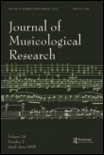
JOURNAL OF MUSICOLOGICAL RESEARCH
Advancing Knowledge in Musicology since 1979JOURNAL OF MUSICOLOGICAL RESEARCH, published by Taylor & Francis Ltd, is an esteemed platform that delves into the field of musicology, contributing to the ongoing dialogue in music research and scholarship since its establishment in 1979. With an ISSN of 0141-1896 and an E-ISSN of 1547-7304, this journal serves as a vital resource for researchers, professionals, and students, offering insights into diverse musicological topics. Although currently categorized in Q4 in Music with Scopus rankings placing it at #110 out of 180 in the Arts and Humanities field, its commitment to excellence and broader discourses in music studies is evident. The journal does not have Open Access options, yet it provides accessible content through reputable academic channels, fostering scholarly exchanges within the community. It aims to publish high-quality research that advances understanding of musical practices and cultural implications, making it a critical resource for those passionate about music and its myriad influences.

BULLETIN OF THE COUNCIL FOR RESEARCH IN MUSIC EDUCATION
Connecting Research and Practice in Music EducationBULLETIN OF THE COUNCIL FOR RESEARCH IN MUSIC EDUCATION, published by UNIV ILLINOIS PRESS, is a premier scholarly journal dedicated to advancing the field of music education through rigorous research and critical discourse. With an ISSN of 0010-9894 and E-ISSN 2162-7223, this journal plays a significant role in disseminating innovative findings and educational practices, ranking in Q1 for Music and Q2 for Education as of 2023. The journal's esteemed position is further highlighted by its Scopus ranking, placing it in the 80th percentile among music-related publications. Covering a time span from 2002 to 2024, it serves as a vital resource for educators, researchers, and graduate students alike. Although the journal does not currently offer open access, its contributions remain crucial in shaping music education research and practice. The BULLETIN not only inspires scholarly inquiry but also enhances the discourse surrounding effective music education methodologies.
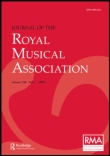
JOURNAL OF THE ROYAL MUSICAL ASSOCIATION
Exploring the depths of musical innovation.JOURNAL OF THE ROYAL MUSICAL ASSOCIATION, published by Cambridge University Press, stands as a significant repository for innovative research and scholarly discourse within the field of music studies. Recognized for its contributions to the understanding of musical practices, theory, and history, this esteemed journal offers a platform for academics and researchers to disseminate their findings to a broad audience. With an ISSN of 0269-0403 and E-ISSN of 1471-6933, the journal has maintained a notable presence since its inception, merging insights from both traditional and contemporary musicology. It currently occupies a Q4 ranking in Music within the Scopus database, reflecting its inclusion within the arts and humanities landscape. While the journal traditionally operates under subscription access, its continuing commitment to advancing music scholarship ensures that it remains an essential resource for students, scholars, and practitioners alike, fostering greater understanding and appreciation of musical artistry from 1987 to the current era.
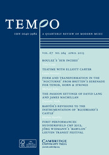
TEMPO
Where Tradition Meets Contemporary Music DiscourseTEMPO, a renowned journal published by Cambridge University Press, is dedicated to the expansive field of music studies. With its rich history dating back to 1939, the journal has significantly evolved, offering researchers, professionals, and students a platform to explore diverse musical perspectives and innovations. Serving as a vital resource in its category, TEMPO is currently positioned in the Q2 quartile within the field of Music, reflecting its quality and academic influence. Although it operates under a traditional subscription model, its impactful contributions to music scholarship are underscored by its active engagement with contemporary issues in musicology, performance, and education. Researchers can rely on TEMPO for cutting-edge analyses, reviews, and critical discourse that shape the understanding of music in society.
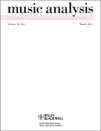
MUSIC ANALYSIS
Charting New Territories in Music AnalysisMUSIC ANALYSIS, published by WILEY, is a prestigious journal in the field of musicology, recognized for its critical contributions to the analysis of music and its myriad influences on culture and society. With an ISSN of 0262-5245 and an E-ISSN of 1468-2249, this journal has established itself as a vital resource for researchers, professionals, and students alike, boasting a Q1 ranking in the 2023 category of Music. As part of a highly competitive field, it ranks 70th out of 180 in the Arts and Humanities Music category on Scopus, positioning it within the 61st percentile. MUSIC ANALYSIS serves as an essential platform for innovative research and insightful discourse, engaging with musical theory, practice, and education from 1996 to 2024. Its commitment to fostering rigorous scholarship makes it indispensable for those seeking to deepen their understanding of music and its analytical frameworks. Although it does not offer Open Access options, its relevance and impact in the genre ensure accessibility through institutional subscriptions and university libraries.